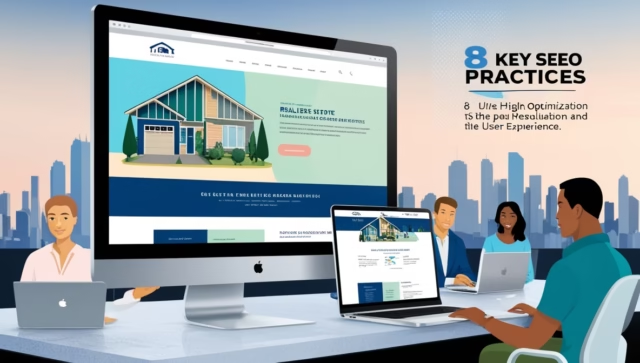In today’s digital-first marketplace, a high-performing real estate website is crucial for attracting qualified buyers, sellers, and investors. With over 90% of home buyers starting their search online, your website needs to do more than simply exist it needs to be discoverable, informative, and engaging.
Search Engine Optimization (SEO) is the most reliable long-term strategy to increase visibility, drive traffic, and convert visitors into leads. If you want your real estate business to compete effectively in your local market and beyond, implementing sound SEO practices is non-negotiable.
Here are 8 key SEO practices that will help you optimize your real estate website for higher rankings and better user engagement.
1. Perform Local Keyword Research
Real estate is a highly local industry. People search for property by city, neighborhood, ZIP code, and even street name. Optimizing your website without targeting these hyper-local keywords is a missed opportunity, which professional SEO services for real estate can help you identify and leverage.
How to implement:
- Use tools like Google Keyword Planner, Ahrefs, or SEMrush to find high-traffic keywords specific to your city or neighborhood.
- Focus on long-tail keywords such as “2-bedroom apartments in Brooklyn,” “homes for sale in Austin TX,” or “real estate agent in Scottsdale.”
- Don’t forget to include phrases like “near me” and other voice search terms, as mobile and voice searches are becoming increasingly common.
Pro tip: Create location-specific landing pages targeting each neighborhood or city you serve.
2. Optimize On-Page SEO Elements
On-page SEO refers to all the optimizations made directly within the website to improve search visibility. This includes meta titles, meta descriptions, headers, URLs, and internal linking.
Best practices:
- Write compelling and keyword-rich meta titles and descriptions.
- Use header tags (H1, H2, H3) to structure your content and include relevant keywords.
- Ensure URLs are clean and descriptive.
- Link internally between blog posts, property pages, and service areas to improve crawlability and distribute page authority.
Why it matters: Search engines use these elements to understand your site’s content and relevance to user queries. Well-optimized pages rank higher and drive more organic traffic.
3. Create High-Quality, Locally Focused Content
Content is the cornerstone of SEO. But not just any content—your content must be valuable, locally relevant, and aligned with your audience’s intent. Blog posts, guides, and neighborhood descriptions can all serve to inform and engage visitors while improving search visibility.
Content ideas:
- Neighborhood guides (e.g., “Living in Downtown Miami: Pros, Cons, and Local Hotspots”)
- Real estate market trends and analysis
- First-time homebuyer tips
- Home staging and selling guides
- Investment property insights for your area
Benefits:
- Establishes you as a local authority
- Increases dwell time and engagement
- Generates backlinks from other websites
4. Implement Mobile Optimization
With over 60% of real estate traffic coming from mobile devices, your website must be mobile-friendly. Google uses mobile-first indexing, which means it predominantly uses the mobile version of your content for indexing and ranking.
Checklist for mobile optimization:
- Use a responsive design that adjusts to different screen sizes
- Ensure fast loading speeds (use Google PageSpeed Insights to test)
- Make buttons and forms easy to click and use on smaller screens
- Avoid pop-ups that interfere with the user experience
A mobile-optimized website isn’t just good SEO—it’s essential for conversion.
5. Optimize for Google Business Profile and Local SEO
Your Google Business Profile (formerly Google My Business) is a powerful tool for local real estate SEO. It allows your business to appear in local search packs, maps, and “near me” results.
Steps to optimize:
- Claim and verify your business listing
- Add accurate business name, address, phone number (NAP), and website URL
- Upload high-quality photos of your office, team, and properties
- Encourage satisfied clients to leave reviews
- Post regular updates and events
Also, ensure your NAP is consistent across all directories and listings (Yelp, Zillow, Realtor.com, etc.). Inconsistent information can confuse search engines and hurt your local rankings.
6. Improve Technical SEO and Site Architecture
Technical SEO focuses on the backend elements of your website that affect how well search engines can crawl and index your site.
Key areas to address:
- Fast page loading speed: Compress images and use caching tools to reduce load time.
- Secure website (HTTPS): Security is a ranking factor—use an SSL certificate.
- Mobile-first indexing: As mentioned, your mobile version must be fully functional.
- XML sitemap and robots.txt: Help search engines crawl and index your content.
- Fix broken links and redirects: These hurt user experience and rankings.
Pro tip: Use tools like Screaming Frog, Google Search Console, and Ahrefs to audit your site’s technical health regularly.
7. Integrate IDX Listings Properly
IDX (Internet Data Exchange) integration allows you to display MLS property listings on your site. While this adds immense value, improper implementation can create SEO issues like duplicate content or poor crawlability.
IDX optimization tips:
- Use an SEO-friendly IDX provider that allows customization and clean URLs
- Avoid iframe-based integrations (they’re not indexable by search engines)
- Add unique content to listing pages to differentiate them (e.g., custom property descriptions, agent insights, nearby amenities)
- Structure listing pages with proper meta tags and schema markup
Proper IDX integration ensures your listings contribute positively to your SEO strategy.
8. Build Local Backlinks and Citations
Backlinks (links from other websites to yours) are one of Google’s most important ranking factors. For real estate websites, local backlinks carry even more weight.
Strategies to earn local backlinks:
- Collaborate with local bloggers, newspapers, or chambers of commerce
- Sponsor community events or charities and get mentioned on their websites
- Guest post on local business or lifestyle websites
- Get listed on local directories and business listings
In addition, build structured citations mentions of your business name, address, and phone number on authoritative real estate directories and local listings like:
- Zillow
- Realtor.com
- Homes.com
- Yelp
- Facebook Business
The more credible sources that reference your business, the more trust and authority your site earns in the eyes of search engines.
Bonus: Track and Measure Your SEO Performance
Optimization is not a one-time activity. You must continually monitor and adjust your SEO strategy based on performance data.
Tools to use:
- Google Analytics – Track traffic sources, user behavior, and conversion rates
- Google Search Console – Monitor indexing, keyword rankings, and technical issues
- Ahrefs / SEMrush / Moz – Analyze backlinks, keyword opportunities, and competitor SEO
Track key metrics such as:
- Organic traffic growth
- Bounce rate
- Average time on site
- Lead form submissions
- Keyword rankings (especially local terms)
Regular audits and reporting will help you refine your SEO efforts and maintain a competitive edge.
Conclusion
The real estate industry is fiercely competitive, and a well-optimized website can be your most powerful marketing tool. By implementing the eight SEO practices outlined above from local keyword research and content creation to mobile optimization and technical fixes SEOFAT can help you position your site to rank higher in search results, attract more visitors, and generate more qualified leads.
Remember, SEO is not a quick win it’s a long-term investment. But for real estate professionals willing to put in the work, the payoff is substantial: more visibility, more trust, and ultimately, more closed deals.







